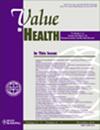Generative Artificial Intelligence for Health Technology Assessment: Opportunities, Challenges, and Policy Considerations: An ISPOR Working Group Report
IF 4.9
2区 医学
Q1 ECONOMICS
引用次数: 0
Abstract
Objectives
To provide an introduction to the uses of generative artificial intelligence (AI) and foundation models, including large language models, in the field of health technology assessment (HTA).
Methods
We reviewed applications of generative AI in 3 areas: systematic literature reviews, real-world evidence, and health economic modeling.
Results
(1) Literature reviews: generative AI has the potential to assist in automating aspects of systematic literature reviews by proposing search terms, screening abstracts, extracting data, and generating code for meta-analyses; (2) real-world evidence: generative AI can facilitate automating processes and analyze large collections of real-world data, including unstructured clinical notes and imaging; (3) health economic modeling: generative AI can aid in the development of health economic models, from conceptualization to validation. Limitations in the use of foundation models and large language models include challenges surrounding their scientific rigor and reliability, the potential for bias, implications for equity, as well as nontrivial concerns regarding adherence to regulatory and ethical standards, particularly in terms of data privacy and security. Additionally, we survey the current policy landscape and provide suggestions for HTA agencies on responsibly integrating generative AI into their workflows, emphasizing the importance of human oversight and the fast-evolving nature of these tools.
Conclusions
Although generative AI technology holds promise with respect to HTA applications, it is still undergoing rapid developments and improvements. Continued careful evaluation of their applications to HTA is required. Both developers and users of research incorporating these tools, should familiarize themselves with their current capabilities and limitations.
用于卫生技术评估的生成式人工智能:机遇、挑战和政策考虑--ISPOR 工作组报告。
目的介绍生成式人工智能(AI)和基础模型(包括大型语言模型(LLM))在卫生技术评估(HTA)领域的应用:我们回顾了生成式人工智能在三个领域的应用:系统文献综述、现实世界证据(RWE)和卫生经济建模。结果:(1)文献综述:生成式人工智能有可能通过提出检索词、筛选摘要、提取数据和生成荟萃分析的代码,帮助实现系统性文献综述的自动化;(2)现实世界证据(RWE):生成式人工智能可以促进流程自动化,并分析包括非结构化临床笔记和成像在内的大量现实世界数据(RWD);(3)卫生经济建模:生成式人工智能可以帮助开发从概念化到验证的卫生经济模型。使用基础模型和 LLM 的局限性包括围绕其科学严谨性和可靠性的挑战、出现偏差的可能性、对公平的影响,以及对遵守监管和道德标准的非同小可的担忧,尤其是在数据隐私和安全方面。此外,我们还调查了当前的政策环境,并就如何负责任地将生成式人工智能整合到工作流程中为 HTA 机构提供了建议,同时强调了人工监督的重要性以及这些工具快速发展的特性:虽然生成式人工智能技术在 HTA 应用方面大有可为,但它仍在快速发展和改进之中。需要继续仔细评估其在 HTA 中的应用。使用这些工具进行研究的开发人员和用户都应熟悉其当前的能力和局限性。
本文章由计算机程序翻译,如有差异,请以英文原文为准。
求助全文
约1分钟内获得全文
求助全文
来源期刊

Value in Health
医学-卫生保健
CiteScore
6.90
自引率
6.70%
发文量
3064
审稿时长
3-8 weeks
期刊介绍:
Value in Health contains original research articles for pharmacoeconomics, health economics, and outcomes research (clinical, economic, and patient-reported outcomes/preference-based research), as well as conceptual and health policy articles that provide valuable information for health care decision-makers as well as the research community. As the official journal of ISPOR, Value in Health provides a forum for researchers, as well as health care decision-makers to translate outcomes research into health care decisions.
 求助内容:
求助内容: 应助结果提醒方式:
应助结果提醒方式:


